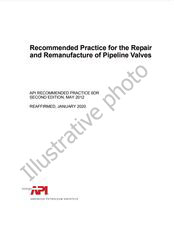We need your consent to use the individual data so that you can see information about your interests, among other things. Click "OK" to give your consent.

API BULL 4565-ed.1
Species and Habitat Conservation—Industry Fundamentals
Translate name
STANDARD published on 1.11.2022
The information about the standard:
Designation standards: API BULL 4565-ed.1
Publication date standards: 1.11.2022
SKU: NS-1139427
The number of pages: 44
Approximate weight : 132 g (0.29 lbs)
Country: American technical standard
Category: Technical standards API
Annotation of standard text API BULL 4565-ed.1 :
API BULL 4565, 1st Edition, November 2022 - Species and Habitat Conservation—Industry Fundamentals
This bulletin is intended to provide oil and natural gas operators with information on conservation measures to support planning and execution of onshore oil and natural gas projects in the United States for conventional and unconventional (shale) developments. The processes and practices described herein are aimed primarily at industry professionals responsible for managing the potential risks of project impacts on biodiversity, but may also be used by contractors, sub-contractors, and vendors. The benefits of employing consistent conservation practices include increased conservation efficiency and stakeholder acceptance.
Oil and natural gas operators acknowledge that activities associated with the development of oil and natural gas resources have the potential to impact wildlife and habitats. These activities can include, but are not limited to, field exploration and production work (such as geophysical and seismic surveys), drilling operations, well completion activities, operations/production activities, construction of well production facilities and related infrastructure, and produced water management facilities.
This bulletin provides flexible and adaptable strategies, acknowledging that the application will vary between operators and environmental settings. Many operators already apply the same or similar practices or processes within their operations. The use of this bulletin is at each individual operator’s discretion.
This document provides a brief explanation of the typical technology, practices, and processes employed by the oil and natural gas industry to identify, explore, develop, and produce hydrocarbon resources. Conservation processes and practices used by the oil and natural gas industry are discussed in more detail.
This document provides general discussion of exploration, construction, development, production, and facilities operations, but does not provide an extensive discussion of applicable local, state, and federal regulatory requirements. It is the responsibility of the operator to review local, state, and federal regulatory requirements applicable in their areas of operation, and, if needed, consult with third parties that have appropriate regulatory, scientific, technical, and legal expertise. Operators should consider referencing other available industry standards and guidance that can provide additional information.
In addition to this document, API has developed other environmentally related standards specifically applicable to shale development, including:
- — API 51R [1], an environmental guidance document for use by the oil and natural gas industry;
- — API 100-1 [2], which contains recommended practices for well construction and fracture stimulation design and execution as it relates to well integrity, groundwater protection, and fracture containment for onshore wells;
- — API 100-2 [3], which contains recommended practices regarding the management of the environmental aspects of shale development during planning site selection; logistics; mobilization; rig-up; demobilization; and well stimulation operations;
- — API 100-3 [4], which contains recommendations for engaging the communities where oil and natural gas development occurs.
We recommend:
Technical standards updating
Do you want to make sure you use only the valid technical standards?
We can offer you a solution which will provide you a monthly overview concerning the updating of standards which you use.
Would you like to know more? Look at this page.



 Cookies
Cookies
